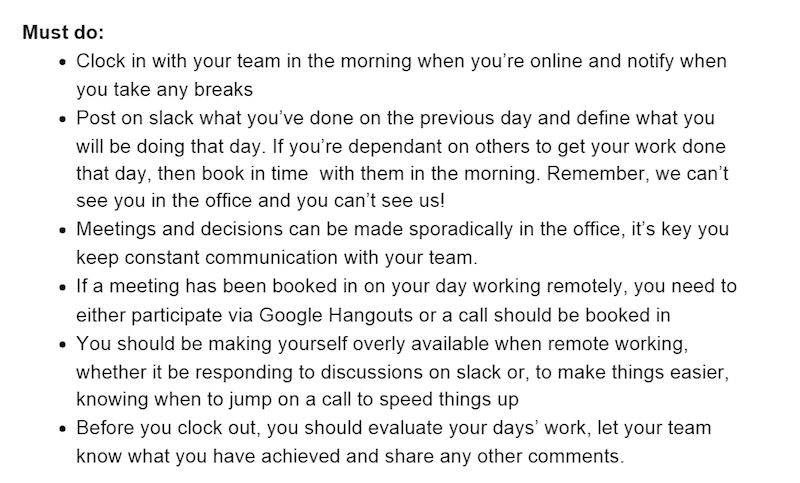
Similarly to Apple TV, Marmite or Coldplay, ‘remote working’ is a concept provoking many different responses and generating both followers and opponents in equal numbers. While some people try to avoid it, quoting diminished productivity levels and loneliness (!), others swear by it and see it as the way to the future. In fact, according to a survey by Office Angels, a third of employees think commuting will be unheard of by 2036.
While various stances on the matter are represented in our office, we enabled the option to work remotely a long time ago. As with any new development in the company it was a process that took time, effort and learning from our own mistakes.
The Benefits
Generally speaking, remote work is a very positive thing for a company to practise. We want our employees to be happy and feel like they work in a relaxed, understanding environment. We have all been there: water leaking into our flat, Krumpet needs to be seen by the vet, kids are waiting to be picked up from football practice. Knowing that you can stay at home and see something urgent through is a heart-warming feeling. Relaxed FOODies equals happy FOODies; happy FOODies are productive FOODies. Emma, FOODit’s Community Manager says:
“Working from home means my work-life balance is much more zen now. I feel calm and collected, and am able to be productive whether I’m in the office or not. Previous jobs made this difficult, which was stressful, and in turn affected my work”.
There are also benefits such as the absence of stressful commuting, a change of scenery and a more flexible environment, resulting in a better work-life balance. On the flipside, there are also certain risks involved. It is far more likely that an employee will miss an important meeting or interview or fail to complete everything that is required of them on that day due to the multiple distractions at home (tempting fridge contents, cat head-butting your laptop, neighbour practising the trombone). Therefore, there need to be certain regulations around remote working in order for it to benefit both sides, work effectively and to not be abused. Here are some of the rules from our remote working policy, helping us regulate the time spent working at home:

Making it Work
The first time someone requested to work remotely was quite late in the FOODit history: more specifically, July 2014, when an employee wanted to work remotely from New York for a week. As the request was unprecedented at that point, we had no policy or system in place to regulate their absence from the office. A document which served as the draft for our current remote working policy was subsequently put together, and used as the guideline for the mentioned employee’s remote working period.
There are no strict government laws around what kind of remote working requirements companies need to follow, except for the sole right of an employee to request flexible working. Therefore, we were pretty much left to our own devices when creating our own policy. We did a huge amount of research, reading articles on related topics and looking at other companies’ systems, yet tried to address our own unique needs as a company and not copy other people’s guidelines. Our policy contains a number of idiosyncratic points that are relevant specifically to us, e.g. using Slack (the cloud-based team chat tool) or participating in daily standups. Doing it in-house was a great solution: we had lots of freedom when working on it and we managed to make it uniquely our own, personal and relatable for the FOODies, rather than having a dry, “corporate” set of rules, e.g.:

We placed the policy on a public wiki so it would be easily accessible in case anyone needs to revisit the guidelines and refresh their memory on some of the rules. Having it there also saves us the time explaining the policy numerous times to new starters.
And the Outcomes?
So far, 40% of workdays in 2016 have been “worked from home” for someone - this time last year it was only 5%. People started working from home more often with no negative effect on productivity which means they feel comfortable and secure doing it, which, in turn, makes us happy! It also improved on how people participate in meetings and interviews: everyone goes above and beyond to make sure they are available and reachable throughout the day. Our RST (Restaurant Success Team) member Satya claims:
“Being a parent of two children, I have the opportunity to work from home which really suits my lifestyle. Funny as it may sound, it also gives my kids the chance to see what I do for a living. With the use of Google hangouts and/or Skype we can still have our daily meetings and go through any tasks that may need attention. This then allows me to still be part of the working day and stay in the loop of what's going on.”
All this goes to say that the right employees will always appreciate the fact that certain rigid policies are in place for a reason and appreciate them without taking advantage. We completely trust our FOODies to work from home just as hard as they would in the office and be honest and conscientious towards their colleagues.
Potential Risks
As we mentioned in the beginning, remote working has its opponents. Distractions, limited contact with colleagues and comfy surroundings might get in the way of your productivity and concentration. However, there are numerous things you can do about it: reducing noise levels, having regular working patterns, interacting with your colleagues as much as possible and many other solutions. Here is what Semyon, our long-time remote-working Java Developer, recommends you to do:
“You must see a clear distinction between work time and rest time. Otherwise, you may encounter some difficulties. During my experience as a remote worker I understood that it's a bad habit to put a job off until the evening or the weekend, so I try to do most of my work between Monday and Friday, start in the morning and not get distracted during the day”
Keeping a healthy work-life balance is not the only challenge for Semyon and a few other permanent remote workers of FOODit, based in Spain, Russia and all over the UK. Maintaining culture and company values can get difficult when you are miles away from the rest of your team. In the second part of this article we will talk about how we tackle the issue of maintaining culture with our permanent remote workers.